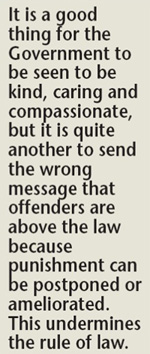
Rewarded for breaking the law?
The concept of the rule of law, which is the fourth guiding principle of our Rukun Negara, can be explained in many ways.
But perhaps it is best explained and summed up in the words of Thomas Fuller, who said more than 300 years ago, "Be you never so high, the law is above you."
Those words were quoted by Lord Denning, the most celebrated English judge of the 20th century.
It was in a case brought by one Mr Gouriet in 1977 when the Attorney-General refused to give him consent to institute relator proceedings to injunct the Union of Post Office Workers from boycotting all postal communications between Britain and South Africa as such actions would constitute criminal offences under the Post Office Act 1953.
When the Attorney-General argued that his discretion was absolute and not subject to judicial review, Lord Denning had this to say, and he said it acerbically:
"What is to be done about it? Are the courts to stand idly by? Is the Attorney-General to be the final arbiter whether the law should be enforced or not?
"It is a matter of great constitutional principle. If the Attorney-General refuses to give his consent to the enforcement of the criminal law, then any citizen in the land can come to the courts and ask that the law be enforced.
"This is an essential safeguard; for were it not so, the Attorney-General could, by his veto, saying 'I do not consent', make the criminal law of no effect.
"Confronted with a powerful subject whom he feared to offend, he could refuse his consent time and time again. Then that subject could disregard the law with impunity.
"It would indeed be above the law. This cannot be permitted.
"To every subject in this land, no matter how powerful, I would use Thomas Fuller’s words over 300 years ago: 'Be you never so high, the law is above you'."
I quoted too Fuller’s words in my letter to the New Straits Times (Parliament, the law and justice for all, Dec 12, 1992) during the constitutional crisis that Rulers were not above the law and if they were, it was because the law had decreed it so and such law could be changed by Parliament.
This echoed the words of Henry Bracton that "the king is under no man but under God and the law because the law makes the king".
Indeed it sounds really good when one recites Fuller’s words aloud, but just how good is it when you reflect upon your many dealings with our public institutions? I need only to expound on three scenarios.
Have you ever heard anyone say any of these?
- "If you like to get this matter approved or resolved by that government department, you need to approach A."
- "If your case is before that judge, it may be wise to engage lawyer B as others will often get a shelling from the judge."
Or have you ever noticed any of these?
- You queue up for hours for your turn to be served at a counter in a government office when someone who is known to the pengarah just walks into his office and gets his things done in a matter of minutes.
- A so-and-so person can walk in and out of that public official’s office as if it is his second home.
Or have you ever experienced this?
Your application is rejected but after the intervention of an influential friend of yours, it is approved.
One then asks if approval can ultimately be given due to the intervention of a "well-connected" person, is the rejection of your original application not devoid of any good reason?
But this is Malaysia, as many would tell you. They would also tell you that you would not be able to survive here if you want to rely solely on your ideals to make a living.
According to them, we can talk and almost everything is negotiable, and we can even talk our way out of many laws.
But how true are these statements?
Well, I do not think they are spurious as the above non-exhaustive scenarios go to show that the way our laws are administered very much depends on who you know and not what you know.
Hence if a fresh practitioner in any field cannot work through the system unless he first gets to know the official personally, then something is very wrong with our system of public administration.
To my mind, if our public institutions give preferential treatment to those who are rich and powerful who possess "strong connections", then this non-legal route is against the principle of the rule of law which requires everyone to be treated equally.
In other words, all persons who are in a similar position should be treated similarly; otherwise such practices will breed a culture of patronage and encourage corrupt practices in our official dealings with government departments.
Affording equal treatment stems from the principle of equality before the law which is one of the cardinal ingredients of the rule of law.
It is enshrined in Article 8 of the Federal Constitution which also states, inter alia, that no one is to be discriminated on the grounds of religion, race, descent, place of birth or gender unless expressly authorised by the Constitution.
As Sultan Azlan Shah once said in one case involving a prince, "This equality of all in the eyes of law minimises tyranny."
The next ingredient of the rule of law is that enforcement of laws requires decisiveness and finality, unless there are compelling reasons to the contrary.

I have often been embarrassed trying to explain to my foreign friends why our Government is in the habit of extending the moratorium periods for traffic offenders to pay up their fines or illegal immigrants to leave the country.
It has come to such a state that these offenders and immigrants take it lightly when the Government next announces the date when they will mobilise forces to apprehend them, as if another postponement to enforcement date is predictable.
This is actually an affront to all law-abiding citizens who pay their fines promptly and the foreigners who did not overstay.
It has become almost like a joke for an offender to say, "It is still early to pay the fine. I shall wait till they announce that discounts will be given or that I should pay by a certain date to avoid prosecution."
It is a good thing for the Government to be seen to be kind, caring and compassionate, but it is quite another to send the wrong message that offenders are above the law because punishment can be postponed or ameliorated. This undermines the rule of law.
In fact, enforcing laws is not in any way different from dispensing justice. I am aware of the words of Abraham Lincoln that mercy bears richer fruits than strict justice.
Indeed justice and mercy are two virtues which often conflict with one another. But if the rule of law is compromised, dispensation of justice will not be possible.
One should not make it so excusable for infidelity to law; otherwise as Abraham Lincoln himself admitted:
"He reminds me of the man who murdered both his parents, and then when sentence was about to be pronounced, pleaded for mercy on the grounds that he was an orphan."
During the nude-squat Commission of Inquiry proceedings in December, Chief Inspector Abdul Aziz Abdul Rahman, the officer-in-charge of the Petaling Jaya District Police Headquarters, when asked why accused persons had to do squats in the nude, answered that "this was the tradition or heritage" even though the Lock-Up Rules were silent on ear-squats.
Likewise, civil servants in some government departments interpret internal guidelines as if they have the force of law when such guidelines are not subsidiary legislation.
These are unlawful practices which are unfortunately practised against those who are not conversant with their legal rights thereby permitting the officials to act above the law.
The problem is compounded when such officials do not even know that these administrative practices and guidelines already entrenched in the system, are in fact not laws.
Dear Malaysians, our country is governed by the rule of law and not rule the law.
No one is above the law, and everyone should be treated equally in their dealings with our public institutions.
There is not supposed to be one law for the rich and powerful and another for the poor and oppressed.
So, the next time anyone should come along and say to you, "Do you know who I am?" I hope you would find Fuller’s words useful, "Be you never so high, the law is above you."
Published in the New Sunday Times on 29 January 2006

 I have often been embarrassed trying to explain to my foreign friends why our Government is in the habit of extending the moratorium periods for traffic offenders to pay up their fines or illegal immigrants to leave the country.
I have often been embarrassed trying to explain to my foreign friends why our Government is in the habit of extending the moratorium periods for traffic offenders to pay up their fines or illegal immigrants to leave the country.
 JOHOR BARU, Jan 17: State officials have been directed to read letters published in newspapers to gauge public sentiment on government projects and services.
JOHOR BARU, Jan 17: State officials have been directed to read letters published in newspapers to gauge public sentiment on government projects and services. Jan 8: The late Tun Abdul Razak once said our enemies are three Cs — communism, corruption and communalism. To fight these enemies, our nation’s greatest weapon is our belief in God — religion, but not religious bigotry.
Jan 8: The late Tun Abdul Razak once said our enemies are three Cs — communism, corruption and communalism. To fight these enemies, our nation’s greatest weapon is our belief in God — religion, but not religious bigotry.